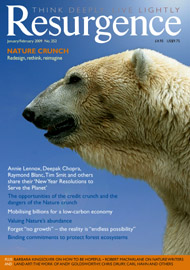HERE IS A book that deals with climate change, and the reader may readily enquire what its original take on this hot topic is. The subtitle of the book answers the question. It deals with climate change from the viewpoint of hope and the human condition.
Hell and High Water is divided into two parts. Part One covers the material on the climate change debate that is covered by many other works. The author, Alastair McIntosh, encourages the reader who is well versed in the climate change debates to consider skipping this section or just skimming it. For the untutored reader on this topic, it is important to carefully reflect on these preliminary chapters as they provide the grounding for the central thesis that is pursued in Part Two.
Part Two constitutes the essential core of the work. In his introductory remarks McIntosh discusses his unique contribution: “My thesis is that the most galling aspect of the problem is driven not by fundamental human needs but by manipulated wants that find expression in consumerism. To mitigate climate change and even adapt to its consequences without losing our humanity, there needs to be a radical activation of our inner lives. That is not something that we can entirely achieve on our own. It also requires change across society – perhaps even what I describe as ‘cultural psychotherapy’.”
McIntosh takes us on a tour of some ancient writings of the past that locate the drama of human predicaments in the depths of the human psyche. Commenting on the ancient wisdoms as seen in Empedocles, Plato, the Old Testament book of Genesis, and the Epic of Gilgamesh, he locates our present global predicament surrounding the issue of climate change in the very depths of the human condition. He demonstrates from these early wisdom writings that there was then, as there is now, a close relationship between social and environmental collapse and the human propensity for hubris that leads to pride, violence and ecocide. He maintains that the power of this earlier thinking constantly throws explanations on the current human condition.
In the chapter ‘Dissociation of Sensibility’, the author discusses the way in which culturally embedded violence damages people’s capacity to have an inner life. This theme is developed through a sustained critical analysis of the mass media and its role in creating spurious and dysfunctional human ‘needs’. With dysfunctional human needs comes an addiction to consumer lifestyles that create entropic ways of living while destroying life processes.
McIntosh emphasises that this type of hubristic violence not only destroys the inner life but simultaneously strips sensibility not only from the violent but also to those who suffer violence. With that, he arrives at the conclusion that tackling the roots of violence and untruth supersedes considerations with the immediate and overt symptoms expressed as climate change. This conclusion in no way dismisses the severity of issues associated with climate change: McIntosh holds that both must be taken in tandem.
In the chapter appropriately titled ‘Colonised by Death’, he examines the influences of modern advertising and its colonisation of the human imagination. We see how the role of propaganda and spin create a consumer consciousness that leads to a state of addictive ‘affluenza’ – a condition in which we are confused about what it takes to live a meaningful life.
In the closing chapters of the book, the author explores the condition of hope for our planet in the midst of the climate change crisis. There is no room for a shallow optimism in our present predicament. Hope is a virtue of a different order of magnitude. McIntosh ponders the possibility that we may not be able to head off the consequences of the hubris that afflicts our planet. Within a matrix of hope we must peer into the unthinkable abyss. Here creativity and hope combine synergistically to help the reader to think outside of the box. “The challenge of climate change”, writes McIntosh, “takes us out of our normal constructs of reality. It pushes us to consider the options for creating a very different kind of world. In so doing, hope that ‘if you keep on going, you will find the bottom’ becomes a veritable survival skill. I do believe that, come hell or high water, love deepens forever, and that is the meaning of this journey.”
In the final chapter, ‘Toward a Cultural Psychotherapy’, McIntosh offers a twelve-step recovery programme inspired by that of Alcoholics Anonymous. It is offered for our consideration as the preliminary steps that he deems necessary for the healing of our collective ‘psychopathology of insensibility’. A deep cultural pathology demands a deep cultural psychotherapy.






